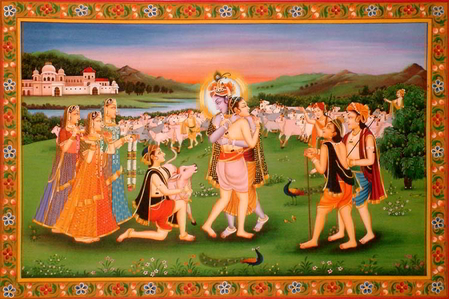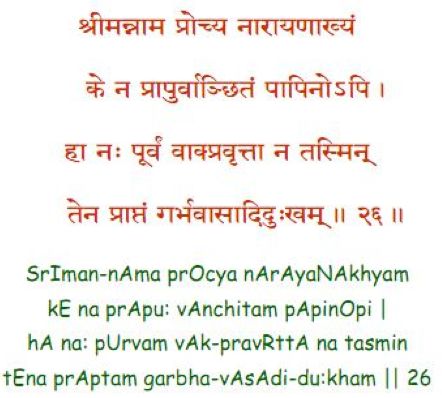AshtAkshara Mantra Japam for freedom from samsaric ills!
Meaning :
In this verse King KulaSEkhara praises the benefits of reciting SrIman- nArAyaNa’s ashTAkshara-mantram and the ills that befall one who does not recite it.
The AzhvAr reminds us of the many passages from tiru-vAi-mozhi where a number of other AzhvArs have reminded us about the good fortunes that come the way of those who recite the ashTAkshara-mantram in devotion. Some of these passages from tiru-vAi-mozhi extolling the blessings of ashTAkshara- mantra-japam are as follows:
“Kulan-taru~n-celvan-tandiDum-aDiyAr paDu-tuyar-Ayinav-ellAm,
nilantara~n ceyyum nIL visumb-aruLum aruLoDu peru-nilam-aLikkum,
valan-tarum maRRun-tandiDum peRRa-tAyinum-Ayina ceyyum,
nalan-taru~n-collai nAn kaNDu-koNDEn nArAyaNA-vennum nAmam”
— tiru-mangai AzhvAr
“Vaidu ninnai vallavA pazhittavarkum,
mARil pOr seydu ninna ceRRat-tIyil-vendavarkkum,
vandu unai-yeydalAgum-enbar”
— tirumozhisai AzhvAr
“Moytta-valvinaiyuL ninRu-mUnRezhutt-uDaiya pErAl,
kattirapandum-anRE parA’ngati kaNDu-koNDAn”
— tonDar-aDi-poDi AzhvAr
Anticipating the above statements by the three AzhvAr-s who appeared after him, SrI KulaSEkhara AzhvAr says that there is no sinner who has not been redeemed by reciting the name of nArAyaNa. Similarly, those who did not shout the name of nArAyaNa ended tasting the ill fruits of samsAra with its endless cycles of bith and death.
SrI KulaSEkharar says:
“nArAyaNa-Akhyam SrIman-nAma prOcya kE pApina: apai vA~nchitam na prApu?”
The AzhvAr queries as to which sinner has not been blessed by reciting the name of SrIman-nArAyaNa. His answer is a resounding: “none”. The AzhvAr implies that regardless of the magnitude of the sins, the sinner is blessed and saved by the Lord once HE hears the sinner invoke HIS name celebrated as nArAyaNa.
The AzhvAr also describes the plight of those who blabber about everything except reciting the name, nArAyaNa. He says that those people end up in endless cycles of samsAra and suffer. The portion of the verse containing this thought in anvaya-kramam is as follows:
“pUrvam tasmin na pravRttA tEna
garbha-vAsAdi du:kham hA! prAptam “
Commentary by: Sri Oppiliappan Koil VaradAchAri Sadagopan










